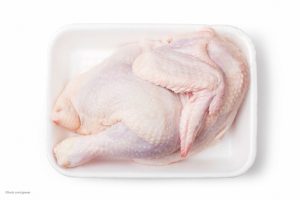In an effort to reduce the incidence of food poisoning in the United Kingdom, the Food Standards Agency (FSA) is urging people to stop washing chicken before preparing it. Campylobacter is the most common form of food poisoning in the UK, sickening bout 280,000 people each year. About 80 percent of those cases are linked to poultry.
 Campylobacter causes an infection called, campylobacteriosis. Symptoms include abdominal pain, severe diarrhea and vomiting. Complications include irritable bowel syndrome, reactive arthritis and Guillain-Barré syndrome, which causes paralysis. Children, seniors. pregnant women and others with weakened immune systems are most at risk.
Campylobacter causes an infection called, campylobacteriosis. Symptoms include abdominal pain, severe diarrhea and vomiting. Complications include irritable bowel syndrome, reactive arthritis and Guillain-Barré syndrome, which causes paralysis. Children, seniors. pregnant women and others with weakened immune systems are most at risk.
“Although people tend to follow recommended practice when handling poultry, such as washing hands after touching raw chicken and making sure it is thoroughly cooked, our research has found that washing raw chicken is also common practice. That’s why we’re calling on people to stop washing raw chicken and also raising awareness of the risks of contracting campylobacter as a result of cross-contamination,” said FSA Chief Executive Catherine Brown.
“Campylobacter is a serious issue. Not only can it cause severe illness and death, but it costs the economy hundreds of millions of pounds a year as a result of sickness absence and the burden on the NHS. Telling the public about the risks and how to avoid them is just one part of our plan to tackle campylobacter. We are leading a campaign that brings together the whole food chain, which includes working with farmers and producers to reduce rates of campylobacter in flocks of broiler chickens and ensuring that slaughterhouses and processors are taking steps to minimise the levels of contamination in birds. We are committed to acting on campylobacter and providing safer food for the nation,” she said.





Yes, its is true that while washing the pathogen can cross contminate the sink and utensils by splattering and aerosolization.